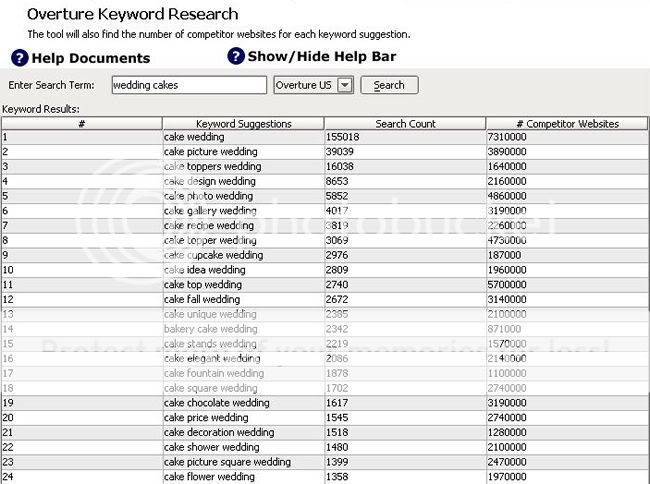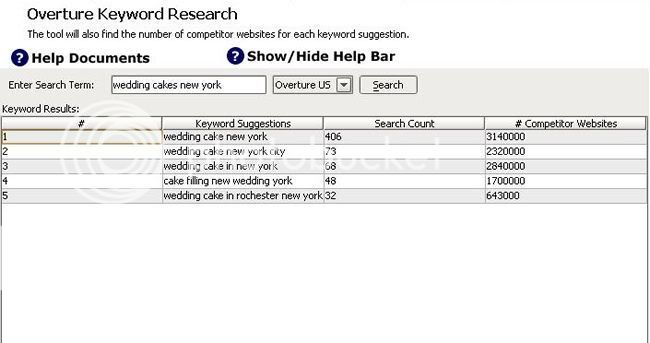Choosing The Keywords Your Website Should Target
Choosing which keywords your website should target is perhaps the most important decision you can make when beginning search engine optimization.The aim of keyword research is to discover which words and phrases will not only bring traffic to your website, but more importantly, bring targeted traffic to your site. Targeted traffic is the traffic that will generate most sales as the searchers will actually get what they are looking for when they enter your website.
Before you use the first keyword that pops into your head it’s wise to first do some research, firstly to find out how difficult it will be to get a good ranking for your chosen keywords and also the number of people that enter those keywords into the search engines, which will give you some idea on the amount of traffic you can expect.
Research Your Keyword
In order to research your keywords you can use WebLink SEO's Overture Keyword Research tool. The keyword research tool enables you to enter a word or phrase and view other similar words/phrases that people have search for, and also how many competitor websites there are for each keyword suggestion. This enables you to search for niche keywords that do not have high levels of competition while also generating targeted traffic to your website.
For example, lets pretend you operate a website that sells wedding cakes. We can see from the Overture Keyword Research tool that the number of people who typed “wedding cakes” into Overture was 155,018 for the previous month.
However, let’s assume the product or service your website offers is not available to a global audience, but rather you want to target a local audience. There’s little point targeting the phrase “wedding cakes” as the majority of people that come to your site won’t be able to buy any wedding cakes as they might not be in the same country as the shop itself! You might get a large amount of traffic to your site, but it’s unlikely you will get good conversion rates, and also the additional time you spent optimizing for this popular phrase could be wasted. Instead you should try to get ‘Targeted Traffic’. This is where you get traffic to your site that is most likely to lead to a sale.
So let’s say our wedding shop is in New York. Rather than targeting the keyword “wedding cakes” you should target “wedding cakes new york”.
If we now look at the overture keyword tool again, we can see that the number of people that type “wedding cakes new york” was less than the number that typed “wedding cakes”, but because we've targeted a more specific phrase, the visitors you do get will be more likely to lead to a sale. It will also be much easier to get a high ranking in the search engines for the term “wedding cakes new york” as there is less competition for that particular phrase.
Analyzing The Competition
So, we now have an idea of what phrase we want to target, let’s look at how difficult it will be to get on the first page in Google for that phrase.
At this stage I want to introduce a new concept – Google PageRank. The way Google (and other search engines) decide which order websites appear in its results is to look at how many websites provide links to a certain website. The more links a website has, the more popular it is deemed to be, and the better the position in the search engine it will receive. This is currently the major factor that determines what position a website will appear in the search engine results. There are other factors (which I will cover in later guides), but this is fundamentally the main factor that the search engines use.
Google PageRank offers a measure of how many incoming links (or backlinks as they’re known) a website has. The PageRank itself is an exponential scale between 0-10, the higher the PageRank of a website, the more links it has coming into the website.
If I use the Search Engine tool in WebLink SEO we can see the Google PageRank for the top 10 results for the term “wedding cake new york”.
I can see that my website would need a PR of at least 4 to stand any chance of getting in the top 10 results. So how many incoming links to my site would I need to get a PR4? Here is a chart that approximately shows how many links are needed to achieve a certain PR from pages with a particular PR.
From the chart you can see for example that if you want to achieve a PR of 5 you need 18 PR5 pages linking to you, 3 PR6's or just one PR7. This of course is just an approximation. If the page has 30 links instead of 50, more PR would be passed and less links are needed to achieve the same PR.
I hope this guide has helped you get started with optimizing your website, and introduced the basics of search engine optimization. In the following guides I will walk you through the process of optimizing your website for the target keyword, and the different methods that can be used to get links from other websites.




0 comments:
Post a Comment